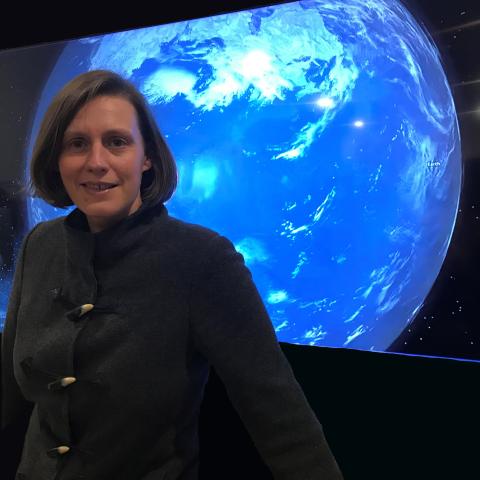Career story
Water is a precious resource in space, just like it is on Earth.
On the International Space Station (ISS), water from astronauts’ urine and sweat is collected and recycled. In a way, astronauts drink the same cup of coffee or glass of water over and over again.
The thing is, the original water recycling system on the ISS needed an upgrade. It was heavy, needed lots of maintenance, and sometimes let contaminants through, making the astronauts sick. NASA and ESA (European Space Agency) investigated a new system that uses aquaporins for water recycling.
Aquaporins are a type of protein found in living cell membranes that let them filter water. The new ISS water recycling system uses aquaporins. We also have aquaporins in our kidneys that help us filter water. Aquaporins can be found in all forms of life.
The power of plants
Caitlin has been researching membrane proteins in plants for over 15 years. She believes that plant aquaporins could help take water filtration technology to the next level. The human body contains 13 types of aquaporins, but plants contain hundreds. Plants need more aquaporins to help them sort all kinds of substances, including salt and nutrients. That means plant aquaporins can help us find ways to filter more than just water.
“Humans can wander around and find the nutrients they need, but plants are stuck in one spot. They have to take nutrients up through their roots and then sort it,” Caitlin says.
“We can use the strategy plants use to build new technologies.”
For example, the nutrients in the waste extracted from the recycled water on the ISS could be useful for growing plants.
“The waste gets wrapped up in a foil bag and stuck on the inside of the spacecraft,” Caitlin says. “But to grow plants in space, you need the nutrients in that waste. So how do you turn transform that waste back into useful clean nutrients? That’s where plant science comes in, because plants are masters at that.”
Using plant science to solve space challenges
Caitlin started thinking about how plant science could advance space technology just a few years ago. She says that trying to solve challenges in space can help us tackle problems here on Earth. For example, she is currently working on a project that aims to develop rice plants require less water.
“When you go into space, you have to be extremely efficient with every resource. It’s also important not to create too much waste,” she says. “When we solve problems in that extreme environment, we learn how to be more efficient with resources on Earth.
Sometimes problems on Earth seem insurmountable, but space is so much harder. Space research forces you to think differently and come up with new solutions.
Career journey
2004
Caitlin was born in Canada and grew up in Adelaide. In 2004, she completed a Bachelor of Agricultural Science (Honours) at the University of Adelaide.
2008
She then started her PhD in plant science with the same university. However, she was based in Canberra, at CSIRO’s Plant Industry Division. Her research looked at improving salinity tolerance in wheat. She completed her PhD in 2008.
Caitlin spent a few years as a postdoctoral research fellow at the University of Newcastle. Her research there focused on how plants transport sugar.
2011
Caitlin returned to the University of Adelaide for another postdoctoral position.
2018
It was around this time that she started thinking about how plant science could influence space technology. She won best pitch at a competition run by the Australian Academy of Science in 2018. Her topic was ‘Keeping plants and astronauts hydrated’.
2019
Caitlin joined the Australian National University (ANU) in 2019 as an Australian Research Council Future Fellow.
2021
Along with two other ANU researchers, Caitlin co-founded a startup called Membrane Transporter Engineers. The company consults on projects where plant science can help advance technology that separates valuable resources from liquid waste.
Caitlin is also a mission specialist with ANU InSpace.

